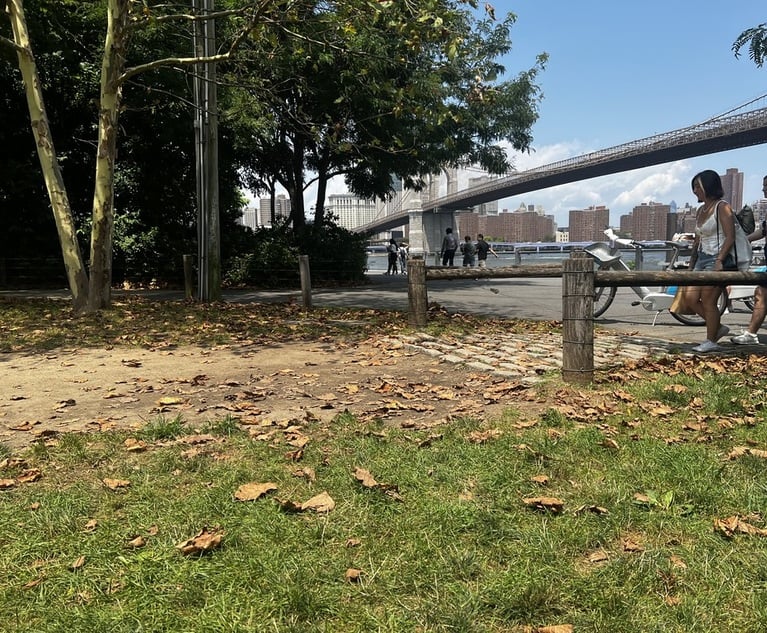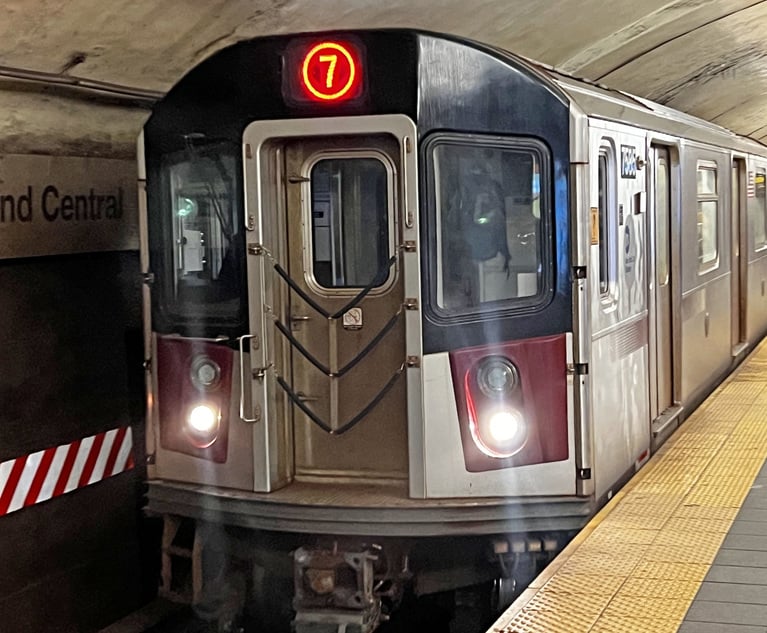Lawyers and Alcohol Abuse: NYC Lawyer Assistance Program Is Here to Help
The findings of the landmark study of 13,000 currently practicing lawyers by the American Bar Association Commission on Lawyer Assistance Programs and the Hazelden Betty Ford Foundation (ABA/Hazelden study) published in the American Bar Journal in 2016 and elsewhere, revealed that between 21 and 36 percent qualified as problem drinkers.
May 25, 2018 at 01:24 PM
8 minute read
 New York City-skyline.
New York City-skyline.
“I drink wine because I don't like to keep my problems bottled up.” “I drink wine because punching people is frowned upon.” “Keep calm and drink wine.” These are real slogans on T-shirts you can buy online by Googling “funny party T-shirts.” What is deadly serious is that these slogans also reflect the daily, real-life struggles with alcohol facing too many in our legal community.
The findings of the landmark study of 13,000 currently practicing lawyers by the American Bar Association Commission on Lawyer Assistance Programs and the Hazelden Betty Ford Foundation (ABA/Hazelden study) published in the American Bar Journal in 2016 and elsewhere, revealed that between 21 and 36 percent qualified as problem drinkers.
A survey of 15 law schools and over 3,300 law students, also released in 2016, found that one-quarter were at risk for alcoholism for which further screening was recommended, see J. M. Organ, D. Jaffe, & K. Bender, “Suffering in Silence: The Survey of Law Student Well-Being and the Reluctance of Law Students to Seek Help for Substance Abuse and Mental Health Concerns,” 66 J. LEGAL EDUC. 116 (2016). Both the ABA/Hazelden study of practicing lawyers and the survey of law student well-being revealed that their respective populations surveyed were also experiencing significant levels of depression, anxiety and stress.
In his 2017 no-holds-barred memoir, “The Addicted Lawyer: Tales of the Bar, Booze, Blow, and Redemption,” Brian Cuban, in long-term recovery since 2007, observes that the biggest mistake lawyers make regarding their alcohol and drug abuse is “the obvious, not seeking help. Lawyers have egos. Lawyers like to show the world that 'things are good,' 'business is great,' all is wonderful.' The truth is often quite the opposite.”
The New York City Lawyer Assistance Program, NYC LAP, is a valuable resource available to New York City lawyers, judges, law students and their family members to get them the help they need. Currently 55 percent of individuals receiving NYC LAP's free and confidential counseling are self-referred. The other 45 percent are referrals from the appellate divisions, law schools, legal employers, the judiciary, colleagues, family members, treatment programs and other LAPS.
When this confidential, free counseling service began in 1999, like other state and local lawyer assistance programs at the time, the focus was on helping lawyers with alcohol-related problems. The range of NYC LAP's counseling services has since expanded along with the mission of other LAP programs nationwide. NYC LAP Director Eileen Travis, LCSW, reports that, currently, mental health-related services make up 50 to 65 percent of referrals. Professional counseling is available for alcohol and substance abuse (prescription and otherwise), gambling and other addictions, depression, anxiety and stress, eating disorders, domestic abuse, anger management—and for virtually any other issue taking a toll on the mental and physical health of a New York City lawyer, judge, law student or family member.
A program of the City Bar Fund, the nonprofit 501(c) (3) arm of the New York City Bar Association, NYC LAP is located at the New York City Bar Association, 42 West 44th St. between 5th and 6th avenues. While the release of the ABA/Hazelden study and the ABA's National Task Force Report on Lawyer Well-Being have recently raised awareness about the relationship between lawyer assistance programs and lawyer well-being, it is noteworthy that May 5 marked 19 years of NYC LAP's service to the New York City legal community.
There are two ways to contact NYC LAP for a confidential consultation: calling the confidential helpline (212-302-5787) or sending a secure email, see http://www.nycbar.org/serving-the-community/lawyer-assistance-program. After contact has been made, Travis and NYC LAP clinical coordinator Randi Anderson (also a lawyer) will extend an invitation to come in, talk about the problem or problems, identify solutions, and develop a plan of action, including recommendations and referrals to outside professionals as needed.
Confidentiality in communications with NYC LAP is protected by New York State law. Communications between a member or authorized agent of NYC LAP is “deemed to be privileged on the same basis as those provided by law between attorney and client. Such privilege may be waived only be the person, firm, or corporation which has furnished information to the committee,” NY Judiciary Law Section 499.
In addition to working with referrals to provide one-on-one assistance, NYC LAP makes confidential recovery groups available for those who are open to, and can benefit from, this type of support. All meetings take place at the city bar. Some meetings are long established and ongoing, such as the Lawyer AA Meeting on Thursdays at 6:30 p.m. and the Lawyer Gamblers Anonymous Meeting on Thursdays from 12:30-1:30 p.m.
From time to time, NYC LAP organizes groups on an ad hoc basis for short-term counseling. This may happen when individuals with an individual counseling action plan in place are dealing with similar issues at the same time and are open to meeting in a group. Currently, for example, there is a group meeting being planned at NYC LAP concerning coping with care-giving issues. A past group was made up of several women lawyers who were going through divorce and other transitions, some also in partnership with lawyer husbands. NYC LAP is also available in special situations, such as providing grief counseling for legal professionals shattered by the loss of a beloved colleague, or providing workshops on vicarious trauma.
Education and outreach are also essential components of NYC LAP's mission. “Beating the drum” about all the NYC LAP has to offer, staff participate in CLE and other city bar programs; give annual trainings; and make numerous presentations to varied groups including bar associations, law firms, public sector groups, law schools and law firms. Recently Travis and Anderson have joined in presentations to large law firms with attorney Lisa F. Smith, author of “A Girl Walked Out of A Bar,” a 2016 memoir about her searing experiences as a Big Law associate with hidden addictions and her ultimate road to recovery, after getting help.
Frequently, NYC LAP presentations feature a lawyer who specializes in representing attorneys involving disciplinary issues or a lawyer in recovery who tells his or her story. Newly admitted lawyers in the First Department watch a video featuring one such lawyer, who is a member of the city bar's LAP Committee, which supports the program's mission. Attorney Ralph Wolf, the committee chair, encourages applications from prospective committee members. He notes that city bar membership is required for LAP Committee membership, but having a personal story of recovery isn't.
The referrals NYC LAP receives from the Appellate Divisions sometimes relate to questions about the character and fitness of bar applicants whose underage drinking, DUIs and traffic violations, for instance, raise red flags. Appellate Division referrals also involve attorney discipline when monitoring by LAP is required to document that an attorney is attending required recovery or other meetings and in regular contact, including face-to-face meetings, with his monitor. Monitors may be members of the LAP Committee or other volunteers. Some self-referrals are from lawyers who face disciplinary proceedings; they request monitoring on a voluntary basis, encouraged by their own lawyers to demonstrate they are taking steps toward rehabilitation on their own.
Travis and Anderson also work with lawyer assistance programs in other states, such as when an attorney who has had discipline assessed by an out-of-state bar is currently living in New York City, or a bar applicant from another state has been requested to provide monitoring information by that state's character and fitness committee. The ABA's Commission on Lawyer Assistance Programs (CoLAP) has a directory of LAP Programs in every state on its website, see https://www.americanbar.org/groups/lawyer_assistance.html, where you can also access “The Path to Lawyer Well-Being: Practical Recommendations for Positive Change,” a report by the National Task Force on lawyer well-being.
Finally, NYC LAP is regularly contacted by law firms seeking professional guidance about how to best address the personal issues of partners and associates that have risen to the level of not only affecting them and their families, but are now damaging the trust of colleagues and potentially firm clients. In these situations, and to everyone who seeks assistance from the program for whatever reason, NYC LAP has this message: “We are always available to help.”
Priscilla Lundin is a New York City lawyer and a member of the New York City Bar Association's Lawyer Assistance Program Committee.
This content has been archived. It is available through our partners, LexisNexis® and Bloomberg Law.
To view this content, please continue to their sites.
Not a Lexis Subscriber?
Subscribe Now
Not a Bloomberg Law Subscriber?
Subscribe Now
NOT FOR REPRINT
© 2024 ALM Global, LLC, All Rights Reserved. Request academic re-use from www.copyright.com. All other uses, submit a request to [email protected]. For more information visit Asset & Logo Licensing.
You Might Like
View All
Decision of the Day: Judge Reduces $287M Jury Verdict Against Harley-Davidson in Wrongful Death Suit

Decision of the Day: Judge Denies Summary Judgment Motions in Suit by Runner Injured in Brooklyn Bridge Park

Decision of the Day: Administrative Court Finds Prevailing Wage Law Applies to Workers Who Cleaned NYC Subways During Pandemic

Trending Stories
Who Got The Work
Michael G. Bongiorno, Andrew Scott Dulberg and Elizabeth E. Driscoll from Wilmer Cutler Pickering Hale and Dorr have stepped in to represent Symbotic Inc., an A.I.-enabled technology platform that focuses on increasing supply chain efficiency, and other defendants in a pending shareholder derivative lawsuit. The case, filed Oct. 2 in Massachusetts District Court by the Brown Law Firm on behalf of Stephen Austen, accuses certain officers and directors of misleading investors in regard to Symbotic's potential for margin growth by failing to disclose that the company was not equipped to timely deploy its systems or manage expenses through project delays. The case, assigned to U.S. District Judge Nathaniel M. Gorton, is 1:24-cv-12522, Austen v. Cohen et al.
Who Got The Work
Edmund Polubinski and Marie Killmond of Davis Polk & Wardwell have entered appearances for data platform software development company MongoDB and other defendants in a pending shareholder derivative lawsuit. The action, filed Oct. 7 in New York Southern District Court by the Brown Law Firm, accuses the company's directors and/or officers of falsely expressing confidence in the company’s restructuring of its sales incentive plan and downplaying the severity of decreases in its upfront commitments. The case is 1:24-cv-07594, Roy v. Ittycheria et al.
Who Got The Work
Amy O. Bruchs and Kurt F. Ellison of Michael Best & Friedrich have entered appearances for Epic Systems Corp. in a pending employment discrimination lawsuit. The suit was filed Sept. 7 in Wisconsin Western District Court by Levine Eisberner LLC and Siri & Glimstad on behalf of a project manager who claims that he was wrongfully terminated after applying for a religious exemption to the defendant's COVID-19 vaccine mandate. The case, assigned to U.S. Magistrate Judge Anita Marie Boor, is 3:24-cv-00630, Secker, Nathan v. Epic Systems Corporation.
Who Got The Work
David X. Sullivan, Thomas J. Finn and Gregory A. Hall from McCarter & English have entered appearances for Sunrun Installation Services in a pending civil rights lawsuit. The complaint was filed Sept. 4 in Connecticut District Court by attorney Robert M. Berke on behalf of former employee George Edward Steins, who was arrested and charged with employing an unregistered home improvement salesperson. The complaint alleges that had Sunrun informed the Connecticut Department of Consumer Protection that the plaintiff's employment had ended in 2017 and that he no longer held Sunrun's home improvement contractor license, he would not have been hit with charges, which were dismissed in May 2024. The case, assigned to U.S. District Judge Jeffrey A. Meyer, is 3:24-cv-01423, Steins v. Sunrun, Inc. et al.
Who Got The Work
Greenberg Traurig shareholder Joshua L. Raskin has entered an appearance for boohoo.com UK Ltd. in a pending patent infringement lawsuit. The suit, filed Sept. 3 in Texas Eastern District Court by Rozier Hardt McDonough on behalf of Alto Dynamics, asserts five patents related to an online shopping platform. The case, assigned to U.S. District Judge Rodney Gilstrap, is 2:24-cv-00719, Alto Dynamics, LLC v. boohoo.com UK Limited.
Featured Firms
Law Offices of Gary Martin Hays & Associates, P.C.
(470) 294-1674
Law Offices of Mark E. Salomone
(857) 444-6468
Smith & Hassler
(713) 739-1250






